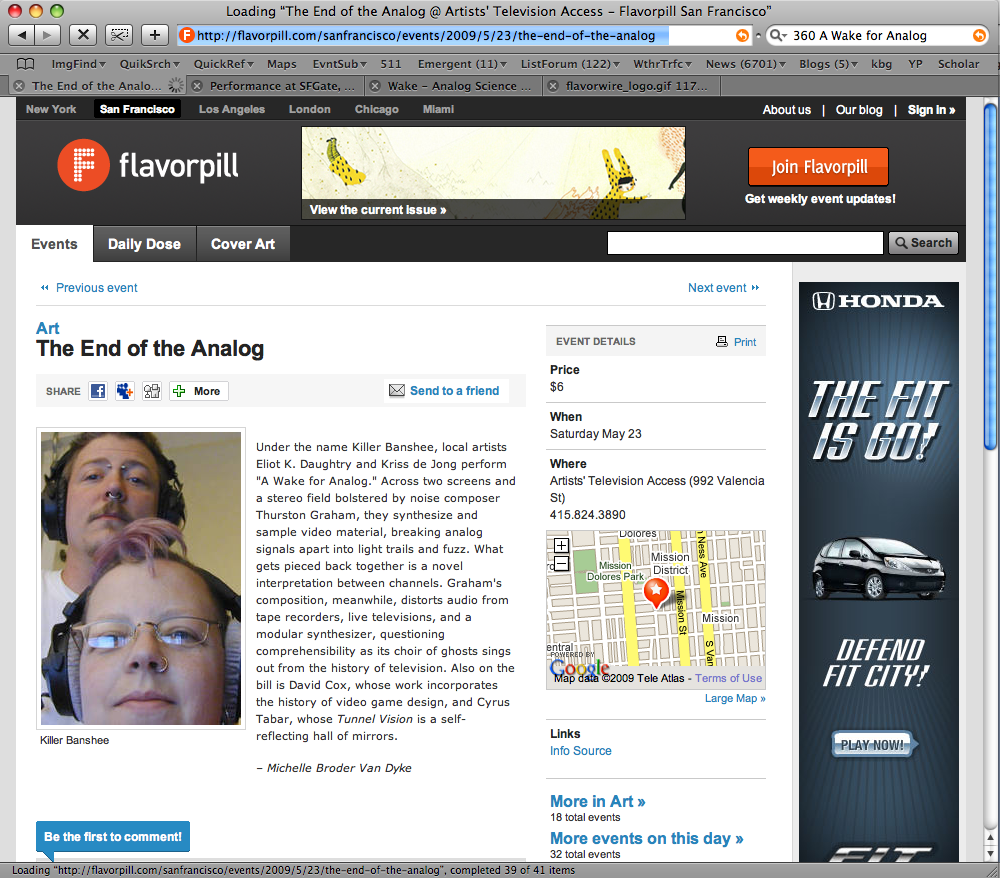|
Press Coverage for A
Wake for Analog (5/23/09)
Flavorpill (
http://flavorpill.com/sanfrancisco/events/2009/5/23/the-end-of-the-analog
) [read text]
SF360 (permalink:
http://www.sf360.org/features/to-a-friend-entering-obsolescence ) [read
text]
SFWeekly (
http://www.sfweekly.com/events/the-end-of-the-analog-1428318/ ) [read
text]

Flavorpill SF -- Art
Under the name Killer Banshee, local artists Eliot K. Daughtry and Kriss De Jong
perform "A Wake for Analog." Across two screens and a stereo field
bolstered by noise composer Thurston Graham, they synthesize and sample video
material, breaking analog signals apart into light trails and fuzz. What gets
pieced back together is a novel interpretation between channels. Graham's composition,
meanwhile, distorts audio from tape recorders, live televisions, and a modular
synthesizer, questioning comprehensibility as its choir of ghosts sings out
from the history of television. Also on the bill is David Cox, whose work incorporates
the history of video game design, and Cyrus Tabar, whose Tunnel Vision is a
self-reflecting hall of mirrors.

SF360 EXPERIENCE
To a friend entering obsolescence
By Jonathan Kiefer
Dear analog,
This isn’t a eulogy, because to my mind you’re not really gone.
You’ll never be gone, just like I’ll never buy a digital converter
for my old TV. I don’t care what the FCC mandates! Also, as you
know, I have a new TV.
I know this note won’t bring you back. I guess I just had to get
my thoughts out there, into the ether, as much for you as for anyone
else who might happen to receive them. I thought you’d appreciate
that.
There’s an event in your honor coming up this Saturday night. They’re
calling it A Wake for Analog. A handful of short experimental multimedia
transmissions and a live, improvisational audio-visual performance
by Oakland’s Killer Banshee, with composer and noise artist Thurston
Graham. It’s all organized by Other Cinema founder Craig Baldwin—yeah,
the maker of Sonic Outlaws, among so many other things, and a guy
who knows whereof he programs—so I’m sure it’ll be something you’d
have liked.
Well, wakes weird me out a little, analog, and in truth I’ve been
pretty emotional about losing you. But I’ll try to rally. I know
I need to bring my gloomy self down to Artists’ Television Access
on Valencia Street, to pay my final respects. And there you’ll be,
in your open coffin of empty airwaves. Just lying there, being dead
right in front of everybody. And it’ll be totally weird, but nobody
will really say anything about how weird it is, because they’re
still sort of in shock, I know they are, and on this night they’ll
probably be drunk too, and maybe a little morbidly fascinated.
“The passing of analog takes with it specific phenomena that become
metaphorical relics,” said Eliot K. Daughtry and Kriss De Jong,
the Killer Banshee folks, on their Web site. “No longer will these
analog traces be directly present; now they become quotation.” It’s
so true. And isn’t that just what our culture needs? More quotation!
Oh, it’s all so sad, analog.
If you were here now, you’d tell me not to worry. It’s progress,
you’d probably say, a noble quest for purification. You were so
generous, that way, so forgiving. You wore your own flaws—your clutter
of tubes and knobs and wires—with such easy confidence, setting
an example. Yes, without you the whole world feels less alive.
And maybe you’d tell me, in your gentle way, with only the softest
hiss in the background, adding texture, that I should have been
ready for this. For years now, everybody’s been talking about you
signing off for good. But the prognosis never seemed to stick. You
know, at the wake, they’ll be showing Nate Harrison’s short video,
Bassline Baseline, a documentary about how Roland’s breakthrough
synth-bass module, the TB-303 Bass Line, didn’t make it in the mid-1980s
music-gear market, but later got tweaked out and taken up by the
UK rave scene, then splashed into the mainstream and swam right
up the charts, from KLF to Prodigy to Madonna. Retro chic isn’t
always just a pose, it suggests; sometimes it’s a creative maturation.
And these things take time.
Harrison opens with something Brian Eno said ten years ago: “The
trouble begins with a design philosophy that equates ‘more options’
with ‘greater freedoms.’” Analog, you’ll be glad—and not surprised—to
know that my Yamaha digital synthesizer is lying neglected like
a dusty ruin in the closet, while the old Wurlitzer electronic piano
still sits right there on the dresser, humming warmly as we speak.
They’re also showing media artist Caspar Stracke’s Zuse Strip, another
comment on the adaptive reuse of cultural artifacts—in this case,
by “utilizing data that is based on an archaeological misinterpretation.”
Until now, I knew next to nothing about the German digital computer
pioneer Konrad Zuse, whose early machines used a system of hole-punched
eight-bit binary code in strips of 35mm film thrown away by Berlin’s
UFA studio. I’m only sorry that I had to lose you in order to find
out. But that’s what wakes are for, right?
And then there’s a short video called Patrolling the Ether, by a
highly strange purveyor of “curious technocultural critiques” who
goes by the name Carl Diehl. Just the other day I tried to watch
a VHS tape of Diehl’s project, but my damn fancy-pants big-screen
hi-def digital TV didn’t even want to parse it. Swell.
I haven’t forgotten how great you were when I first got that TV,
by the way. How magnanimously you endured my rapture over all the
impossibly crisp pictures and sounds. Even the occasional pixelated
interference seemed cool and futuristic at first. But I know now
what’s really been lost. I know nothing ever will replace the stubborn
vertical roll of your backflipping, snowy screen, or the screeching
drone that sometimes rang out over your color bars.
Anyway, I could at least make out Diehl’s eerie retro computer-voiced
narration, serving up the usual cold-comfort condolences. Oh, you
know, that same old greeting-card stuff about keeping things in
perspective: “Images are often difficult to make out as anything
more than optical noise,” or, “Obsolescence is the moment of super
abundance.” I tell you, analog, I hope I won’t always be so glum
about all of this. I hope one day I’ll be able to believe Diehl’s
assurance that “the end of analog broadcasts endorses all manner
of etheric patrols…from modular synthesis to otherwordly exchanges.”
Even if I never do know what the heck it means. In the meantime,
I raise my glass to you.
Wow, analog. We had some good times, didn’t we? Some people may
have called you fickle and limited, but I stood by you. Sometimes
literally: You remember how I used to stand next to the old TV for
what seemed like hours at a time, swearing under my breath and swiveling
those rabbit ears around in a million different directions—or just
hovering there awkwardly, not daring to let go? Well, that’s still
how I feel.
topics: artists' television access, bay area, diy, exhibition, experimental
film, shorts
05.21.2009

SFWeekly
Rabbit-Ear Blues
By Michael Fox
We’ve been beaming TV signals into space for decades
with no reply, or at least none that we can decipher. What if
it’s because those advanced life forms couldn’t play analog transmissions,
and now they’re so friggin’ far beyond digital? Our quasi-scientific,
quasi-philosophical musings are inspired by the Other Cinema’s
video program “The End of the Analog,” featuring the latest performance
piece by East Bay duo Eliot K Daughtry and Kriss De Jong, aka
Killer Banshee. A Wake for Analog finds KB snatching samples from
the petrified remains of American broadcast history to construct
an improvised tour of an imaginary day on television from sign-on
to sign-off. Self-described electronic artist/noise composer Thurston
Graham supplies the accompaniment, filling the aural sphere with
irreverence and flair. It’s a show for anyone old enough to be
nostalgic for signal interference — from snow to horizontal roll
— or young enough to have missed out on the ephemera, and frustration,
of overlapping channels and unwanted flickers. Wait a second —
what if the ghost images were the extraterrestrials trying to
communicate with us? Maybe we should have kept that old Motorola.
|



